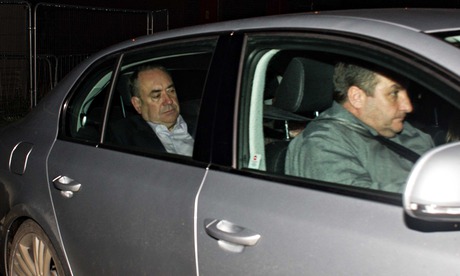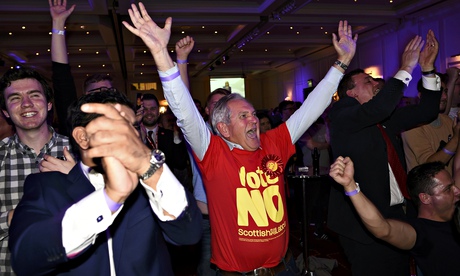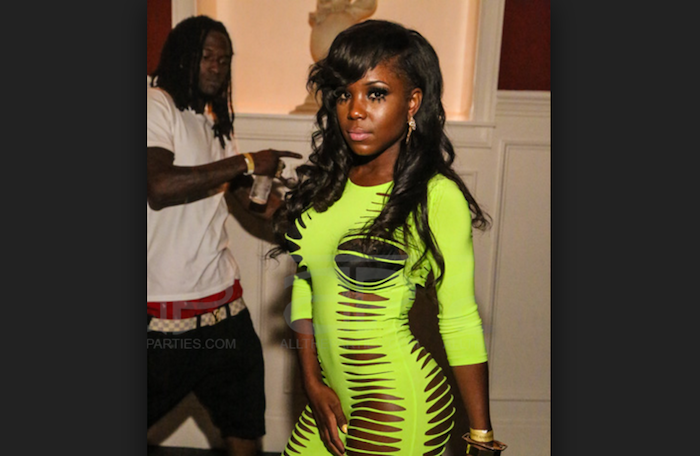Scotland says no to Independence – Scotland has voted against ending its 307-year-old union with England and Wales, with the Scottish National party conceding defeat in the historic referendum.
The result was mathematically certain to be a victory for the Better Together campaign after 30 of Scotland’s 32 local authorities declared, including the major cities of Glasgow, Edinburgh and Aberdeen. An estimated 55% of voters are expected to reject First Minister Alex Salmond’s prospectus for independence when all the results are declared.
More
- Download JOY Album by Wizkid – (Full Album Download)
- Popular Nollywood actress takes off everything in her bedroom, shares pix online (See Photo)
- Nigerian girl goes WILD at a night party with a man [Video]
- Davido Congratulated Wizkid [ See Why ]
- Photos: Venus Williams str1ps fully NA K£D and looks like a goddess (Look)
- Kim Kardashian Rocks Sheer Leggings with ‘no Panties’ On.. Showing her… (See Pics)
The yes campaign scored four big successes, winning 53% in the largest city of Glasgow, 54% in West Dunbartonshire, 57% in Dundee and 51% in North Lanarkshire.
However, the no camp was victorious in 26 authorities. It won overwhelmingly in areas where it was expected to do well, including Edinburgh, Aberdeenshire and Borders, but also in areas that could have gone to the yes campaign, including Falkirk, Inverclyde, Eilean Siar and Clackmannanshire.
Awaking to a likely victory for Better Together, David Cameron, the prime minister, tweeted that he had spoken to Labour former chancellor Alistair Darling, leader of the no campaign, and congratulated him on a “well-fought campaign”.
Salmond sounded a defiant note in a speech shortly after 6am, saying he accepted Scotland had not “at this stage” decided to vote for independence. He also issued a warning to the unionist parties that they must make good on their promises to give more power to the Scottish parliament.
“Scotland will expect these to be honoured in rapid course,” the first minister said, adding that he would “work constructively in the interests of Scotland and the rest of the UK”.
Salmond began his address by thanking the people of Scotland for casting 1.6m votes for independence and praised the inspiring nature of the campaign. “We have touched sections of the community who have never before been touched by politics,” he said.
Nick Clegg, the deputy prime minister, said the referendum “marks not only a new chapter for Scotland within the UK but also wider constitutional reform across the union”.
Echoing the SNP’s argument, he said a vote against independence “was clearly not a vote against change”.
“We must now deliver on time and in full the radical package of newly devolved powers to Scotland,” he added.
No campaign supporters react to a declaration in their favour, at the Better Together Campaign headquarters in Glasgow, Scotland. Photograph: Dylan Martinez/Reuters
Yet that result raises the risk of further turmoil, with MPs from Cameron’s Conservative party threatening to revolt against the prime minister’s late and potentially vital vow to quickly increase the Scottish parliament’s powers while protecting its spending.
Cameron and the Queen will both move to calm tensions when they deliver statements on Friday. The prime minister will seek early in the day, in the words of one cabinet minister, to “cement in” the no vote by outlining how he will deliver the deepening of Scotland’s devolution settlement, including handing greater powers over tax and welfare, to Holyrood.
The Queen, who has monitored the referendum with interest, will make a written statement on Friday afternoon. It is understood that her remarks will focus on reconciliation.
The prime minister wants to move fast to show that the three main UK party leaders will live up to their commitments made during the referendum campaign to deliver what former prime minister Gordon Brown called Home Rule within the UK. Ministers believe it is important to move quickly to avoid a repeat of the 1980 referendum in Quebec.
The triumphalist behaviour of Ontario fuelled the separatist cause that nearly succeeded in a second referendum in 1995.
But Michael Gove, the chief whip, made clear that greater protections would have to be offered to protect the interest of English, Welsh and Northern Irish MPs.
Despite the margin of the no campaign’s victory, Salmond will now press for a substantial shift in power from Westminster to Holyrood, after the widely praised independence campaign – branded the “greatest in Scottish history” by the first minister, came within only five points of victory.
Salmond, who appeared to realise defeat was imminent by cancelling an expected appearance at his local count, for Aberdeenshire, is poised to demand that Scotland be ceded sweeping tax powers, buoyed by the significant surge in backing for independence.
He watched the first results from television at his home in Strichen, Aberdeenshire, before flying down by private jet from Aberdeen airport to Edinburgh, his disappointment tempered only by a substantial yes vote in Dundee, with 57% voting yes.
For the no campaign there was relief: a spate of authoritative polls in the final days of the campaign had said the vote was on a knife edge, bringing Yes Scotland within touching distance of victory after a dramatic surge in support.
Labour’s exit polling in 30 out of Scotland’s 32 councils suggested they were on course to win by 55% to 45% – a finding that the early results appeared to confirm.
Sterling jumped, reaching a new two year high against the euro in Asian trading hours, as the referendum was called in favour of the no vote. A further rally is now expected when dealing opens officially during London trading while the FTSE 100 was expected to open over 1% higher, which would leave it 60 points off its all time peak.
Howard Archer, chief European & UK Economist at IHS Economics, said: “Sterling had a quite sell off in recent weeks. There will be a relief rally”.
He said that the market will now expect the Bank of England to raise interest rates “early next year” and that a yes vote would have delayed expectations for a rise in rates off the low of 0.5% – the level at which they have been set since March 2009.
“The UK economy, most businesses and the markets will likely all heave a huge sigh of relief that the Scots have rejected independence – and by a slightly larger margin than the recent polls had suggested. There would likely have been serious adverse near-term repercussions for the economy both south of the border and particularly in Scotland from a yes vote,” said Archer.
In mid-August, the two campaigns had been 14 points apart – that gap suddenly closed to just six points, to four and then two. No camp strategists were nervous that the very high turnout, which hit 90% in some areas, could give yes a very narrow victory.
One shock poll for YouGov only 10 days before polling had put the yes campaign ahead for the first time, electrifying the contest and stunning the City; the value of sterling fell and more than £2bn was temporarily wiped off the value of Scotland’s top seven companies.
An ICM poll for the Guardian put yes on 49% and no on 51% – a result too close to call.
Some 4,283,392 people had registered to vote in the busiest day in Scottish electoral history. Across the board turnouts were high, often well over 80%, although it dropped to 75% in Glasgow.
But it was lower than expected in the pro-independence areas of Dundee at 78.8% and Glasgow at 75% but higher in areas more likely to vote no, including 89.6% in Edinburgh and a predicted very high number in the Borders.
But as the first results and turnout figures were announced, Yes Scotland’s hopes began fading fast. The first to declare was Clackmannanshire, a tiny county in central Scotland with under 1% of the electorate but one seen as a political bellwether.
It was expected to vote yes, but went for no, by 54% to 46% – a figure identical to the last opinion poll of the contest, from YouGov published after the polls closed on Thursday night.
And then a spate of smaller councils declared for no: two, the Orkney and Shetland islands, were expected, but the yes campaign had high hopes for the Western Isles, where both the Scottish National party holds both the Holyrood and Westminster seats. In the event, the no vote narrowly won, by 10,545 to 9,195.
By then, it had emerged that the turnout in Glasgow – the largest electorate in Scotland with 486,000 voters was lower than all other councils, at 75%. Dundee, with 118,721 voters, voted as expected heavily for yes but its turnout too was lower than expected, at 78.8%. Both diminished the likely vote for independence across Scotland. West Dunbartonshire became the second to vote yes, with a 5,000 vote margin over no.
CLICK HERE to follow us on Google+ so as to get updates on published posts & videos
TOP POSTS YESTERDAY
- Popular Nollywood actress takes off everything in her bedroom, shares pix online (See Photo)
- Photo: See how this pretty girl exposed her b00bs & body so cheaply! This is so bad! (Must See)
- Meet the Six Hottest Female Musicians In Nigeria [ Photo]
- How Omawumi’s boobs popped out on stage (Look)
- OMG!! See this 3 year old girl who already has bigger br£asts than most girls (Must See)
- OMG : Davido Is The Only Man I Can Have A $ex Tape With – Maheeda
- Photo: Tiwa Savage steps out without panties nor bra (Look)
- Check Out Lamido Sanusi’s Vintage Rolls Royce
- How To Know When A Woman Is Attracted To You (LOOK)
- OMG!! You need to see what this girl wore to a Church… (Must See)
- Pics of popular Nigerian actress resurfaces online to haunt her! (See Pics)
- NBC bans Lil Kesh’s ‘Shoki – See [ Details]
- See the adorable Birthday Message Annie Idibia Sends to Hubby [ Photo ]
- HILARIOUS ! Watch Ellen-DeGeneres recreate Nicki Minaj’s ‘Anaconda [ VIDEO ]
- 5 Moves Women Love In Bed, But Can Be Too Afraid To Ask (Must See)
- See the celeb that ruptured a girl’s cervix after having $ex with her (See Photos)
- Anita Joseph Shares Sexy Vacation Pics
- Photos: Tonto Dikeh spreads her legs wide open (Look)
- Runtown meets Lady With Largest “UKWU” in Africa, Miss Corazon Kwamboka (Photos)
- Photos: Tiwa Savage performs in a controversial nu d£ attire (Look)





































Discussion about this post